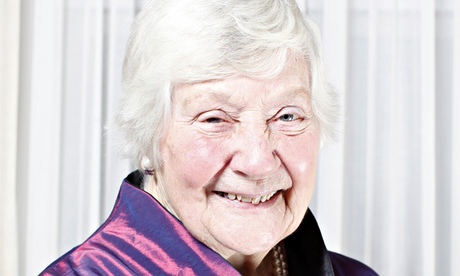
As a child, my happiest memories are of living at my mother’s [the writer Vera Brittain] little cottage near Lyndhurst in the New Forest during the war. I remember sitting in the garden listening to Neville Chamberlain’s famous speech. We began spending more time there because our London house in Chelsea was so damaged from bombing, and my mother found it the perfect place to write.
I was three years old when I had a dim feeling that my mother was well-known – she’d become a bestseller after writing Testament of Youth in 1933. When I was seven my headteacher told me how delighted she was that my mother was going to speak at speech day. I was utterly horrified – partly because I knew I’d be beaten up in the playground.
My parents gave me strong values. My mother was an iconic figure for me because I could see what she stood for. She was a pacifist who was more of an example than an instructor. She didn’t go on about moral values, but she had them all right. I did not emulate her, although I’ve tried to have moral courage – difficult sometimes when it means standing up against your close friends and colleagues.
My father taught me the Catholic just war theory where war has to be morally justifiable with a series of guidelines. He was a soldier in the second world war, and an academic who had an ability to get on with people of all backgrounds. He hated prejudice and he had great social tolerance.
My brother John was a widower when he died in 1987 aged 60. He and his wife left two children, so they joined my family. They had four children who are my grand-nieces and nephews. The youngest recently got married, so I’m the last of that generation for them. We’re very close.
Bernard, my first husband, was an atheist and tolerant of my Catholic faith, which is important to me. Our marriage breakdown was caused firstly by us working in towns 50 miles apart, which meant we only saw each other at weekends. Secondly, some people in the 1970s could be cruel to the husbands of well-known women, and they would refer to him as Mr Shirley Williams, or as my consort. He was a generous, brilliant man and a great philosopher, but being treated like that grated with him.
I didn’t want to get married again. I thought here I am as a cabinet minister and we’re going to have trouble again, but Dick [Harvard professor Richard Neustadt who died in 2003] persuaded me. I was friends with Dick’s first wife long before I knew him. They were a happy couple and then she contracted multiple sclerosis. He retired so he could look after her. Towards the end, she said to Dick that he should remarry, and he ought to think about marrying me. He was also a marvellous man.
My daughter Rebecca is a lawyer. Her style is one of close, detailed analysis that comes partly from her father. She’s more forensic, precise and detailed than me.
I’m very close to my two grandsons. Sam, 13, is a chip off the old block and just like me. He’s passionate about politics and he started the debating society at his school. Nat, nine, is a more artistic, graceful boy who dances across the room like Billy Elliot and he’s less like me.
The family matters a lot to me as a unit. Rebecca’s husband died in his early 50s three years ago. He had a rare form of septicaemia caused by a cat scratch that lasted for nine years. Watching someone whom you love die is hard. It was tough for Rebecca and the boys because their father was always with them. I don’t kid myself that family life is all smooth, happy, sunlight and joy – especially in a family like mine where there are strong personalities. Nevertheless, when you go through it together, you develop a very strong bond. It’s not a sentimental bond – it’s an indispensible bond.
• Testament of Youth is released on DVD on 18 May

